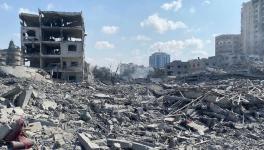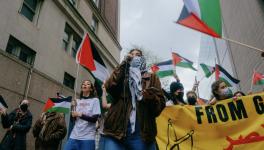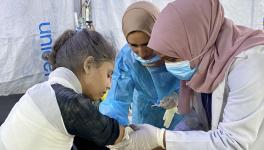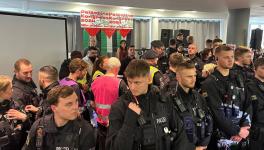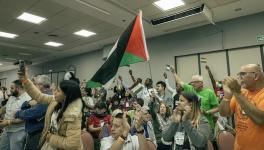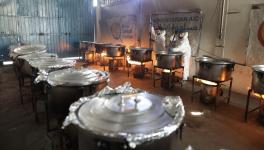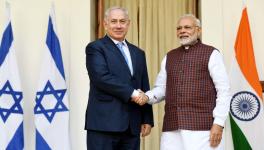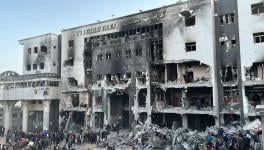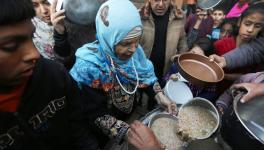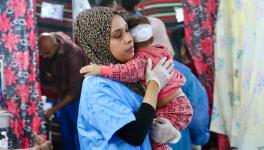ICJ to Respond to South Africa’s Genocide Case Against Israel on Jan 26
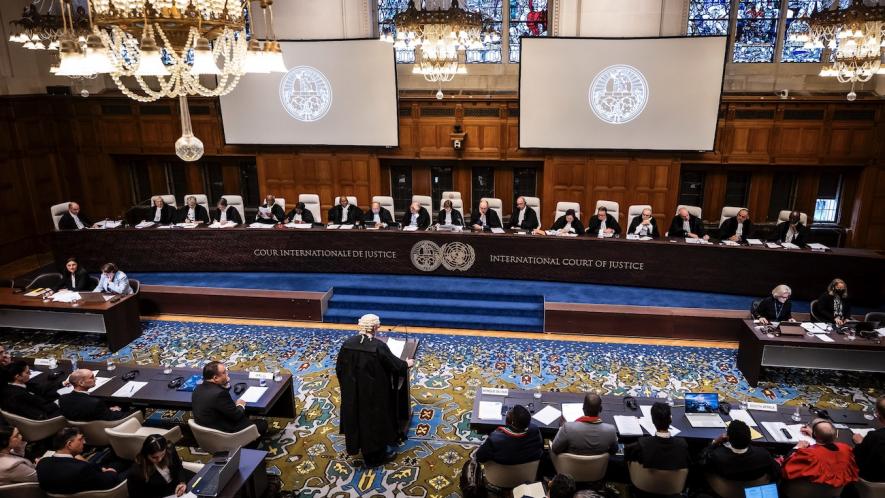
The ICJ hearings on South Africa's case against Israel. Photo: ICJ
This Friday January 26, the International Court of Justice (ICJ) will issue a decision on South Africa’s request for provisional measures to bring an end to Israel’s ongoing genocide in Gaza. The order will come two weeks after South Africa and Israel presented their arguments before the court in the historic case.
On December 29, 2023, Pretoria had approached the ICJ, which is the chief judicial institution of the United Nations, accusing Israel of violating its obligations under the 1948 Genocide Convention in relation to its months-long war on the besieged Gaza Strip.
The application asserted that Israel’s actions were “genocidal in character because they are intended to bring about the destruction of a substantial part of the Palestinian national, racial, and ethnical group”.
Pretoria’s application calls on the ICJ to determine and declare that Israel has violated its obligations as a party to the Convention on the Prevention and Punishment of the Crime of Genocide. However, pending a final ruling on the case, it urged the court to indicate provisional (or emergency) measures to “protect against further, severe, and irreparable harm” to the Palestinian people and to “ensure Israel’s compliance” with the Genocide Convention not to engage in genocide, and to prevent and to punish genocide”.
Read more: South Africa takes Israel to ICJ for crime of genocide in Gaza
Hearings on this request for provisional measures were held on January 11 and 12.
The measures sought by South Africa include an immediate suspension of Israel’s military operations in and against Gaza, for it to “desist” from committing all acts defined as genocide under the 1948 Convention. This includes inflicting conditions of life calculated to bring about the “physical destruction” of Palestinians as a group through acts such as forced displacement, deprivation of food, water, and humanitarian assistance and “the destruction of Palestinian life in Gaza”. Israel must also prevent the destruction of evidence of the crimes outlined in the application.
The application notes importantly that in order to indicate these measures, the ICJ does not at this stage need to definitively determine if Israel has indeed violated the 1948 Convention and committed genocide. Rather, it only needs to establish that the acts described are capable of falling within the provisions of the Convention, or at the very least, can be characterized as “ plausibly “genocidal”.
Read more: Genocide as pattern and policy: ICJ hears South Africa’s case against Israel
South Africa outlined a series of “compelling circumstances” that require urgent action from the court including that— “nowhere is safe in Gaza”, “besieged and bombed hospitals are no longer able to treat the sick and wounded”, “international experts are warning of imminent mass starvation”, “Palestinians in Gaza are being killed at the rate of approximately one person every six minutes”, and “Israel continues to prevent sufficient humanitarian assistance to Palestinians in Gaza”.
Each of the circumstances described by South Africa in its submission made over three weeks ago persist in Gaza today. In fact, Israel killed more than 1,000 Palestinians in the week following the adjournment of hearings at the ICJ.
Read more: Deflect and deny: Israel responds to South Africa’s accusation of genocide at ICJ
The genocide continues
Despite claims, including by the US, that Israel has shifted to “low intensity phase” of warfare, the Occupation has continued its massacres in Gaza, “encircling” the city of Khan Younis in the south of the Strip on January 23. Over 200 Palestinians were killed over the course of 24 hours. As attacks continued on Wednesday, at least nine people were killed after Israel hit a United Nations shelter in the city.
The Palestinian Ministry of Health had also stated on Tuesday that the Nasser and Al Amal hospitals were under “extreme danger” from Israeli bombardment.
The Palestinian Red Crescent Society (PRCS) reported that Israeli drones were firing at “anyone moving” around the Al Amal hospital, and that ambulances were unable to reach the wounded. The siege on the hospital continued on January 24, accompanied by intense shelling and gunfire around the hospital.
The risk of famine in Gaza is “increasing each day”, as at least one in four households or over 500,000 people are facing “catastrophic” hunger characterized by “extreme lack of food, starvation, and exhaustion of coping capabilities”. Reports have emerged of Palestinians resorting to consuming animal fodder to survive, while aid agencies continue to face “access denials” and restrictions by Israel, especially in northern Gaza.
“No one will stop us”
The decisions issued by the ICJ are legally binding. However, the court does not have a mechanism to enforce compliance. Israeli Prime Minister Benjamin Netanyahu has already declared that “no one will stop us, not the Hague…and not anyone else”.
The ICJ will notify the UN Security Council of the provisional measures it has ordered. The Court has the authority to determine these measures, and as such, may differ from what has been requested by Pretoria. If South Africa considers that Israel has failed to abide by the judgment, it can approach the Security Council to determine what action has to be taken. However, all signs indicate that Israel be protected by the veto power held by the US.
The decision that the Court will take on Friday is also being considered as a test of the “rules-based international order” of which the US considers itself the sole arbiter. As Irish lawyer Blinne Ní Ghralaígh had said in her remarks to the court, “the very reputation of international law — its ability and willingness to bind and to protect all peoples equally — hangs in the balance”.
Meanwhile, just days before Friday’s decision, Nicaragua announced that it requested permission from the ICJ to intervene in the case brought by South Africa, citing its own obligations to prevent genocide under the 1948 Convention.
“Nicaragua, like the international community, considers that the actions undertaken by Israel constitute clear violations of the [Genocide Convention], acts which have been accompanied by statements from the highest authorities of Israel that clearly reveal the genocidal intention and dehumanization to which the Palestinian people have been subjected”, the government said in a statement.
It added that Nicaragua’s decision reflected the “commitment of the Government of Reconciliation and National Unity and the people of Nicaragua in the liberation of the Palestinian people and humanity in general from the scourge of genocide”.
Get the latest reports & analysis with people's perspective on Protests, movements & deep analytical videos, discussions of the current affairs in your Telegram app. Subscribe to NewsClick's Telegram channel & get Real-Time updates on stories, as they get published on our website.









